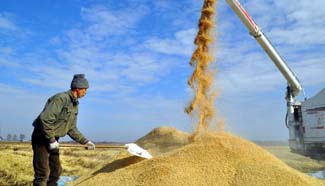CANBERRA, Oct. 14 (Xinhua) -- Australian researchers are leading the charge to produce "next-generation" food crops with larger yields and a greater ability to ward off the negative effects of drought.
Research led by the Australian National University (ANU) is paving the way for drought-resistant crops which will provide farmers with higher yields compared to more traditional grains such as rice and wheat.
Lead researcher Dr Hugo Alonso-Cantabrana from the ANU's Research School of Biology said crops such as sorghum, sugarcane, millet and maize used a different form of photosynthesis, called C4, that made them more efficient at turning carbon dioxide, light and water into useful sugars.
"They do this by taking up carbon dioxide from the air and concentrating it in specialized cells deep in the leaf," Alsonso-Cantabrana said in a statement on Friday.
Meanwhile the study's co-researcher, Hannah Osborn, said wheat and rice were known as C3 plants and used the oldest form of photosynthesis - one which was considered less efficient - while plants using C4 photosynthesis had the advantage of being more resistant to climates with higher temperatures and lower rainfall.
She said the team studied the role of an enzyme commonly known as green millet, which helps boost the efficiency of those C4 plants.
"C4 plants can capture carbon dioxide from the air while losing less water from their leaves, but little is known about what determines the efficiency of this process," Osborn said.
"We think that under adverse conditions such as drought or high temperatures, having a lot of this enzyme could be advantageous for the plant."
The team has indicated it will continue the research to test how the enzyme handles extreme environmental conditions, something they believe could one day bring drought-resistent crops to regions in need.










